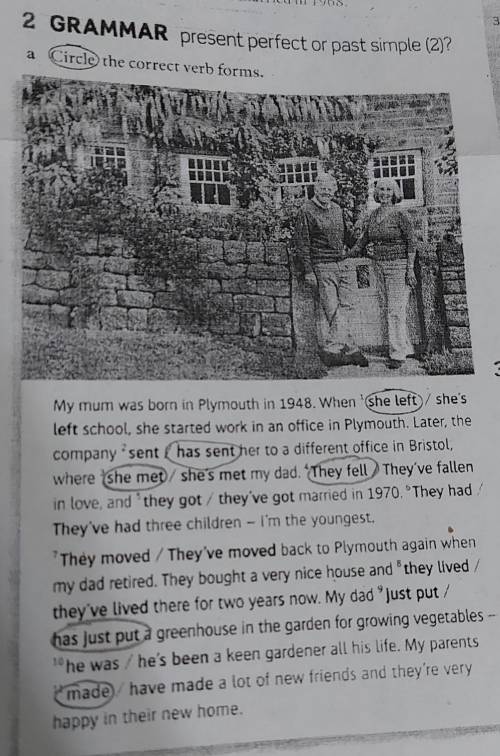2 GRAMMAR present perfect or past simple (2)? a Circle the correct verb forms.
4
3
a
My mum was born in Plymouth in 1948. When she left she's
left school, she started work in an office in Plymouth. Later, the
company sent has sent her to a different office in Bristol,
where she met she's met my dad. They fell They've fallen
in love, and they got / they've got married in 1970. They had
They've had three children - I'm the youngest.
?They moved / They've moved back to Plymouth again when
my dad retired. They bought a very nice house and they lived
they've lived there for two years now. My dad Just put /
has just put a greenhouse in the garden for growing vegetables --
"he was / he's been a keen gardener all his life. My parents
made have made a lot of new friends and they're very
happy in their new home.

Другие вопросы по теме Английский язык
Популярные вопросы
- Напишите эссе по поводу поднятой проблемы приведите необходимые аргументы...
1 - Упростите выражение (√a/√a+√b+√a/√a-√b)*a√b-b√b/2...
1 - При каких целых значениях m, (7m+5)/(m+3) принимает целые значения?...
1 - (x+4)(x-3) -(x-5)(x+2) = 6решите уравнение...
2 - благодарна!Надо заполнить таблицу. например пример примерЭпитеты-красное...
1 - Придумать рассказ о жизни древних людей...
3 - Напишите вывод, по истории всемирной , проотличие НЭПА от военного...
2 - 5 вариант. Определить окислитель и восстановитель, процесс окисления...
2 - На перерві хлопці й дівчата грали у Слова-рими . Хлопці придумали...
1 - Сочинение на тему Недросоль Д.И.Фонвизин. Как класическая комедия....
3
1. My mum was born in Plymouth in 1948. When she left school, she started work in an office in Plymouth.
Explanation: Since we are talking about a specific point in the past when she left school and started work, we should use the past simple tense. Therefore, the correct verb forms are "left" and "started."
2. Later, the company sent her to a different office in Bristol, where she met my dad.
Explanation: Since we're talking about a past event that happened before the present moment, we should use the past simple tense. Therefore, the correct verb form is "met."
3. They fell in love, and they got / they've got married in 1970.
Explanation: Both verb forms "got" and "they've got" are grammatically correct here, but they convey slightly different meanings. "Got married" in the past simple tense suggests a one-time event in the past, while "they've got married" in the present perfect tense suggests a connection to the present. Since we are talking about an event that happened in a specific year (1970), the past simple tense is more appropriate. Therefore, the correct verb form is "got."
4. They had / They've had three children - I'm the youngest.
Explanation: Both verb forms "had" and "they've had" are grammatically correct here, but again, they convey slightly different meanings. "Had" in the past simple tense suggests a completed action in the past, while "they've had" in the present perfect tense suggests a connection to the present. Since we are talking about the number of children they have had up until now, the present perfect tense is more appropriate. Therefore, the correct verb form is "they've had."
5. They moved / They've moved back to Plymouth again when my dad retired.
Explanation: We're talking about a past event, but there is a connection to the present as they are currently living in Plymouth. Therefore, we should use the present perfect tense to show the action's relevance to the present. Therefore, the correct verb form is "They've moved."
6. They bought a very nice house and they lived / they've lived there for two years now.
Explanation: "Lived" in the past simple tense suggests a completed action in the past, while "they've lived" in the present perfect tense suggests a connection to the present. Since they are still living in the house at the time of speaking, the present perfect tense is more appropriate. Therefore, the correct verb form is "they've lived."
7. My dad just put / has just put a greenhouse in the garden for growing vegetables.
Explanation: "Just put" in the past simple tense suggests an action that happened very recently, while "has just put" in the present perfect tense suggests an action that happened in the past and has a connection to the present. Since we are talking about a recent action that has a relevance to the present, the present perfect tense is more appropriate. Therefore, the correct verb form is "has just put."
I hope this helps! Let me know if you have any further questions.